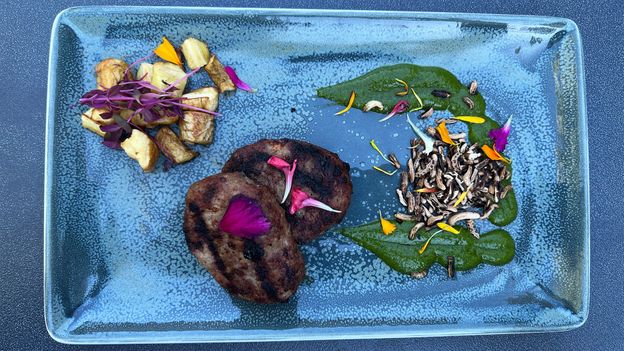
It's a thoughtful entry point for conversations about indigenous history – something inherent to the mission of The Sioux Chef, the company Sherman, an Oglala Lakota chef, founded in 2014, and co-owns with Thompson.
Their business started with catering and pop-ups and now includes a food truck, the non-profit North American Traditional Indigenous Food Systems (NATIFS) – from which the Indigenous Food Lab, a professional indigenous kitchen and training centre in Minneapolis' Midtown Global Market is based – and, of course, Owamni.
The wheels are already in motion to replicate the Indigenous Food Lab across the country, with immediate plans for locations in Montana and Alaska, and, eventually, into more than 45 satellite locations across the United States, Canada, New Zealand, Australia and South America.
"North America's history begins with indigenous history," Sherman said.While he and culinary cohorts – like James Beard finalist Crystal Wahpepah, chef Nephi Craig of Café Gozhóó in Arizona, cook and educator Hillel Echo-Hawk and I-Collective co-founder Neftali Duran – have long been working to shift the conversations around indigenous food, the cuisine is still just gaining a foothold in the US.Though she and Sherman know some people still favour trendy food photos over the story behind the food, they're banking on the fact that the more exposure people have to indigenous culture, the more they'll want to learn its history.
"History books were written by the US government," said Sherman."When you follow American history, you'll see that from 1800-1900, indigenous people still had [access to] over 80 percent of land [in the US], but by the end of that century, had access to just two percent.".In his cookbook, The Sioux Chef's Indigenous Kitchen, Sherman explains that fry bread – often the only thing people associate with Native American food – is "a difficult symbol connecting the present to the painful narrative of our history.Displaced and moved to reservations, they lost control of their food and were made to rely on government-issued commodities – canned meat, white flour, sugar and lard.
Obesity and tooth decay did not exist among indigenous people of North America before colonial ingredients were introduced.".
"It's not ancient history," he said.Every culture has its own connection to food, including how it's prepared, grown and consumed.For indigenous people, food sovereignty – the right to healthy and culturally appropriate food and the right to define food and agriculture systems – was erased through colonisation.
Sherman hopes to put the power back in the hands of the people, because he believes when you control your food, you control your destiny.
In North America, ingredients like the tepary bean, a culturally appropriate food and an important heirloom crop brought back from near extinction by Ramona Farms in Arizona, grow abundantly in areas without a lot of water."We know the names of more Kardashians than we do trees," Sherman said.While Sherman won the James Beard Awards for Leadership in 2019 and for Best American Cookbook in 2018, this year's best new restaurant honour opens more space for conversations about history, privilege and the continued fight for a seat at the table"The staff, city, other business owners, Native community, people who come with their roller bag from the airport who didn't make a reservation – it's this organism now," she said
"We're just trying to take as much knowledge from our ancestors and creating spaces to learn – working backwards to start to reclaim it so that we have a true (r)evolution of indigenous foods," he saidBBC.com's World's Table "smashes the kitchen ceiling" by changing the way the world thinks about food, through the past, present and future